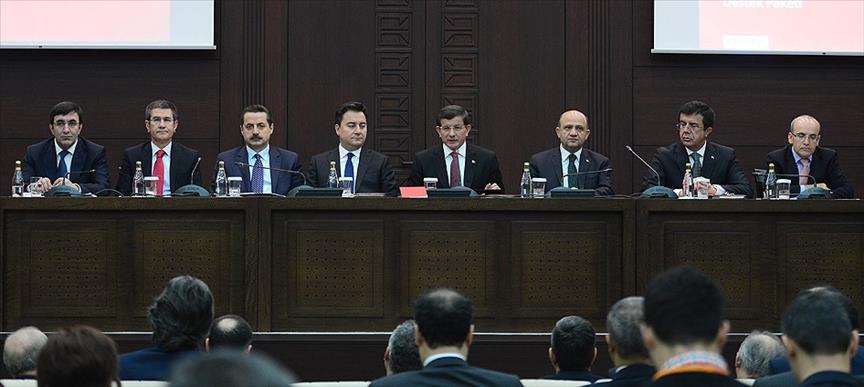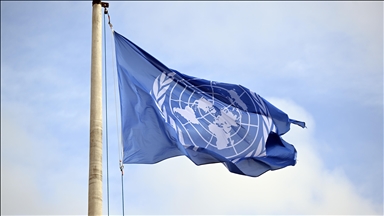
ANKARA
Turkish Prime Minister Ahmet Davutoglu has announced an 11-item package of measures to increase employment, spanning from vocational training support for employers to tax relief.
His comments came on Thursday three days after the Turkish Statistical Institute said unemployment in Turkey had risen by 0.2 percent from November 2014 to reach 10.9 percent in December, as the rate of people joining the workforce outstripped the pace of new job creation.
Speaking at the Prime Ministry office at Ankara's Cankaya Palace at the presentation of a scheme entitled Package to Boost Employment, Industrial Investment and Production Davutoglu said: "Our key priority as the government is to switch to high-technology, intensive production and employment."
He told a press conference that the latest global economic crisis had proved that economies with production-based industries which prioritized employment could more easily resist economic crises while service-based economies had proved weaker.
He said the new package would create 120,000 new jobs by increasing the number of employed in public utility professions.
"Turkey achieved a figure of 1.4 million new jobs created in 2014," he said.
'No negative impact'
The package will create an additional cost of about $7.5 billion to the national budget, including the 100 Turkish lira-rise for retirement pensions, said the premier.
"But, this cost won't have a negative impact on our budget structuring," he added.
The 11-step package starts with support for the Turkish Employment Organisation Iskur for employers in private sector businesses to pay trainees minimum wage during a six-month vocational training period.
"If the trainees are employed in the same sector following their training, Iskur will pay the employer's national insurance contribution for 42 months in manufacturing sector and 30 months for other sectors," he said.
The second step is a 50 percent rise in tax relief for enterprises which are making investments.
Davutoglu further said new investors in 2015 will enjoy more support and tax relief.
"High-tech investments will be categorized as prioritized investments and more incentives will be introduced so as to enable the qualitative transformation of production," he added.
'Assets into cash'
Another step of the package called the "facilitation of access to financing" where the use of the owner's equity will be encouraged through tax relief.
The premier said it was an incentive for companies to resort to their own equity, instead of taking on loans.
"The non-cash assets will be turned into cash, and efforts will be made to attract capital abroad to Turkish domestic market," he said.
Davutoglu maintained of treasury-backed warranties would be expanded so as to involve small and medium scale enterprises, or SMEs, in manufacturing as well as female entrepreneurs.
He said they initiated a new practice to ease women entrepreneurs' access to financing and accordingly increase women employment.
"It will enable women entrepreneurs a warranty of 85 percent for five-year-term credits up to 100,000 Turkish lira," he added.
'Growth preserved'
Davutoglu added financing support would also be provided for research-and-development-based industrial investment via the Turkish Development Bank.
The Turkish government will also facilitate SMEs' access to financing through arrangements which will eliminate obstacles to the use of movables as collateral and security.
Turkey managed to substantially maintain its economic growth performance in 2014 despite sharp volatility in global financial markets and negative geopolitical developments in its region, Deputy Prime Minister Ali Babacan said in Tuesday.
He said: "Global financial markets churned the year 2014 because of uncertainties in monetary policies implemented by advanced economies; (also) negative effects of geopolitical crises increased and unfavorable weather conditions limited growth.
"Last year, EU expanded 1.3 percent, Eurozone 0.9 percent and Latin America saw 1.3 percent growth. But in 2014, Turkey managed to preserve its growth performance at 2.9 percent."
The Turkish Statistical Institute said on Tuesday that the country’s growth rate was 2.6 percent for the last quarter of 2014, and annual growth stood at 2.9 percent, both of which were higher than previously estimated.
Anadolu Agency website contains only a portion of the news stories offered to subscribers in the AA News Broadcasting System (HAS), and in summarized form. Please contact us for subscription options.


